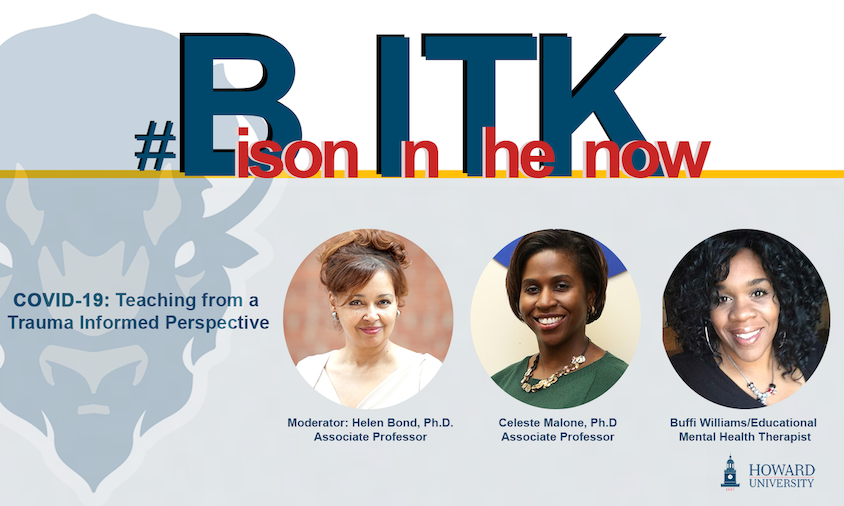
WASHINGTON – Two faculty members from the Howard University School of Education and an Ohio-based educational mental health practitioner joined #BisonInTheKnow for a virtual recorded panel discussion entitled “COVID-19: Teaching from a Trauma Informed Perspective.” The discussion is moderated by Associate Professor of Curriculum and Instruction and Chair of Howard University Online Helen Bond, Ph.D. Panelists include Celeste Malone, Ph.D., associate professor and coordinator of the School Psychology Program and Buffi Williams, MSSA, LSW, LCDC III, coordinator of the New Day Life Center, a community organization focused on emotional wellness and academic success.
Amid the COVID-19 pandemic, Bond started the conversation by citing statistics taken by the United Nations that reveal disruptions in normal education operations for more than 290 million students across the globe. Entire school districts and colleges and universities are currently utilizing distant learning practices with the prolonged prospect of physical distancing, rising death tolls, and serious economic decline as a result of COVID-19.
“I think we can all agree today that we are in an era of trauma,” Bond states, before explaining the discussion topics she posed to each panelist, including defining a trauma-informed practice, learning difficulties for students and families during traumatic events, and addressing common issues remotely as educators and practitioners.
Defining trauma-informed practice
One of the three overarching themes of Malone’s primary research interest is the relationship between culturally competent practice and student outcomes. She says the first part of taking a trauma-informed approach to instruction is providing psychoeducation about what trauma actually is. Malone describes it as more than simply a singular event and equates the COVID-19 pandemic to a series of continuous trauma.
“We are all living under an umbrella of anxiety not knowing if we’re going to contract COVID-19 or if someone that we care about could contract COVID-19,” she says. “This creates a continuous on-going trauma that students and families have to deal with.”
Malone says it is important for instructors to identify and describe the physiological, emotional and cognitive impacts associated with responding to trauma. She has recently witnessed students feeling unmotivated and disappointed in how productive they are being in comparison to how they envisioned things several weeks ago and expressed how to normalize feelings related to traumatic events.
“As an instructor, we should talk about those feelings and use self-disclosure in small amounts to let them know that they are not alone in experiencing this,” Malone explains. “By providing psychoeducation, we can reframe their responses as a typical physiological response to trauma.”
Addressing and identifying learning difficulties for students and families during traumatic events
Through her work with the New Day Life Center, Williams addresses the psychosocial needs and patterns of adjustment required to help stabilize the emotions of children living in complex family systems. Approximately 90% of the families she works with are single-family households. Along with the normal challenges of living within a complex family system, single parents are adding “educator” to their already lengthy list of roles. Williams says her interactions with some parents show insecurities in their ability to educate their children.
“It is important to remind the parents of very practical things like, ‘it’s okay to take a break,’” she says. “We are not looking for quantity right now, it’s really quality time for parents with children to understand what they are going through and be the strength they need.” It has been an amazing moment to watch the resiliency and growth of not only the children but their parents who say, ‘wow, we’re really doing this.’”
Additional topics discussed during the panel include ways to modify teaching practices during distant learning, COVID-19’s disproportionate impact on communities of color and personal mental self-care tips for students, parents and educators.
For more information on the School of Education, visit https://education.howard.edu.
#BisonInTheKnow is an online news and information campaign that offers useful tips and advice from Howard’s faculty experts about issues that are important to the Black community. Follow #BisonInTheKnow on Twitter, Facebook and Instagram for featured content. Like and share resources for the Bison community using the #BisonInTheKnow hashtag.
###
About Howard University
Founded in 1867, Howard University is a private, research university that is comprised of 13 schools and colleges. Students pursue studies in more than 120 areas leading to undergraduate, graduate and professional degrees. The University operates with a commitment to Excellence in Truth and Service and has produced one Schwarzman Scholar, three Marshall Scholars, four Rhodes Scholars, 11 Truman Scholars, 25 Pickering Fellows and more than 70 Fulbright Scholars. Howard also produces more on-campus African-American Ph.D. recipients than any other university in the United States. For more information on Howard University, visit www.howard.edu.
Media contact: Ramzey Smith, Office of University Communications, ramzey.smith@howard.edu




